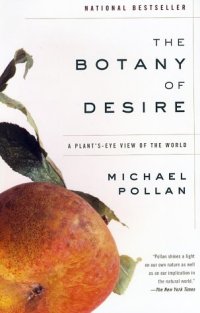
Ebook: The Botany of Desire: A Plant's-Eye View of the World
Author: Michael Pollan
- Year: 2001
- Publisher: Random House
- Language: English
- epub
Amazon.com Review Working in his garden one day, Michael Pollan hit pay dirt in the form of an idea: do plants, he wondered, use humans as much as we use them? While the question is not entirely original, the way Pollan examines this complex coevolution by looking at the natural world from the perspective of plants is unique. The result is a fascinating and engaging look at the true nature of domestication. In making his point, Pollan focuses on the relationship between humans and four specific plants: apples, tulips, marijuana, and potatoes. He uses the history of John Chapman (Johnny Appleseed) to illustrate how both the apple's sweetness and its role in the production of alcoholic cider made it appealing to settlers moving west, thus greatly expanding the plant's range. He also explains how human manipulation of the plant has weakened it, so that "modern apples require more pesticide than any other food crop." The tulipomania of 17th-century Holland is a backdrop for his examination of the role the tulip's beauty played in wildly influencing human behavior to both the benefit and detriment of the plant (the markings that made the tulip so attractive to the Dutch were actually caused by a virus). His excellent discussion of the potato combines a history of the plant with a prime example of how biotechnology is changing our relationship to nature. As part of his research, Pollan visited the Monsanto company headquarters and planted some of their NewLeaf brand potatoes in his garden--seeds that had been genetically engineered to produce their own insecticide. Though they worked as advertised, he made some startling discoveries, primarily that the NewLeaf plants themselves are registered as a pesticide by the EPA and that federal law prohibits anyone from reaping more than one crop per seed packet. And in a interesting aside, he explains how a global desire for consistently perfect French fries contributes to both damaging monoculture and the genetic engineering necessary to support it. Pollan has read widely on the subject and elegantly combines literary, historical, philosophical, and scientific references with engaging anecdotes, giving readers much to ponder while weeding their gardens. *--Shawn Carkonen* From Publishers Weekly *Starred Review.* On the sixth anniversary of its original publication, Pollan's scientific twist on the human/plant symbiosis makes its audio debut. Pollan preaches a unique sort of romantic environmentalism where humans and plants satisfy each other's desires for survival, enjoyment, satisfaction and escape. He uses the apple, tulip, Cannabis and potato to develop his ideas, offering the histories of each and how they developed reciprocal relationships with the humans with whom each interacted. Scott Brick exudes excitement and breathes life into the recording—the timbre of his voice offering just the right touch of humor and depth. Listeners will feel like Brick truly loves the book and loves reading it aloud. It's a great combination for listeners: interesting subject, great writing and wonderful reading. Definitely not to be missed. (Reviews, Apr. 9, 2001) Copyright © Reed Business Information, a division of Reed Elsevier Inc. All rights reserved.
Download the book The Botany of Desire: A Plant's-Eye View of the World for free or read online
Continue reading on any device:

Last viewed books
Related books
{related-news}
Comments (0)